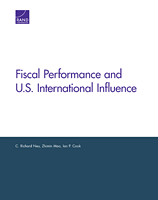| 来源类型 | Research Reports
|
| 规范类型 | 报告
|
| ISBN | 9780833081711
|
| 来源ID | RR-353-RC
|
| Fiscal Performance and U.S. International Influence |
| C. Richard Neu; Zhimin Mao; Ian P. Cook
|
| 发表日期 | 2013
|
| 出版年 | 2013
|
| 页码 | 76
|
| 语种 | 英语
|
| 结论 |
Historically, the United States Has Been Able to Use Its Economic Strength and Influence Constructively- In some cases, the United States has used its influence to encourage or induce other nations to support institutions, programs, and initiatives or has provided substantial financial support.
- In others, the United States had been sufficiently strong and self-confident to promote or preserve institutions or conditions through forbearance, tolerating less-than-ideal behavior from partner countries.
Its Ability to Do so Recently Has Been Mixed- U.S. successes include organizing international sanctions against Iran; making significant contributions to financial regulation in the wake of the last fiscal crisis; and leading international efforts to enforce prohibitions against money laundering, illegal tax avoidance schemes, and violations of trade sanctions.
- On the other hand, the United States has not provided financial support to its struggling European allies or to Arab Spring nations. And European nations have bluntly rejected some U.S. advice and efforts, citing U.S. debt issues. Failure to come to grips with fundamental issues of government finance cannot be helping U.S. international credibility.
Fiscal Constraints Are Inhibiting U.S. Actions- They may be undermining U.S. willingness to incur the risks inherent in international leadership and limiting the financial resources to back up international initiatives.
- They are clearly diminishing the U.S. ability to make necessary adjustments at home.
|
| 摘要 |
- Relying on economic growth is not enough. It is necessary both to increase revenue and decrease outlays, and current legislation is inadequate to the task.
- From the standpoint of preserving U.S. international influence, the preferred spending reductions would be for entitlement programs. This would leave more resources for the activities that contribute directly to U.S. international influence — defense, international representation and assistance — and that create future productive capacity — investments in infrastructure, R&D, and education.
- The Budget Control Act mandates restraint in discretionary spending only; spending for entitelements is exempt from cuts. Preserving U.S. international influence will require a different approach.
|
| 主题 | Economic Planning
; Economic Policy
; Government Legislation
; International Economic Relations
; United States
|
| URL | https://www.rand.org/pubs/research_reports/RR353.html
|
| 来源智库 | RAND Corporation (United States)
|
| 资源类型 | 智库出版物
|
| 条目标识符 | http://119.78.100.153/handle/2XGU8XDN/107500
|
推荐引用方式
GB/T 7714 |
C. Richard Neu,Zhimin Mao,Ian P. Cook. Fiscal Performance and U.S. International Influence. 2013.
|
|
文件名:
|
1379702995715.gif
|
|
格式:
|
GIF
|

|
文件名:
|
RAND_RR353.pdf
|
|
格式:
|
Adobe PDF
|
除非特别说明,本系统中所有内容都受版权保护,并保留所有权利。